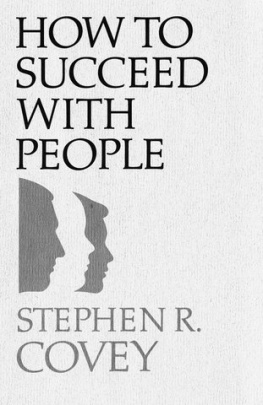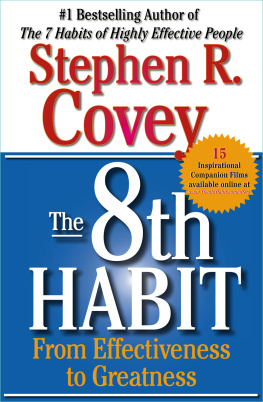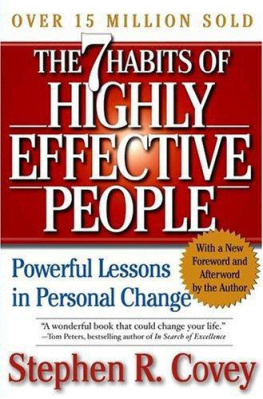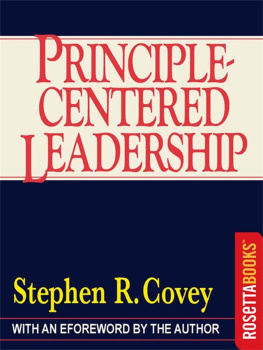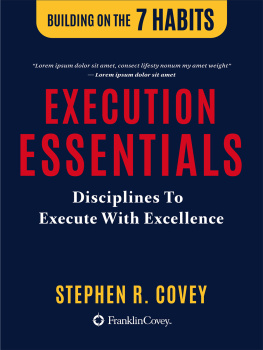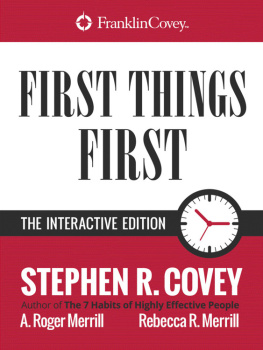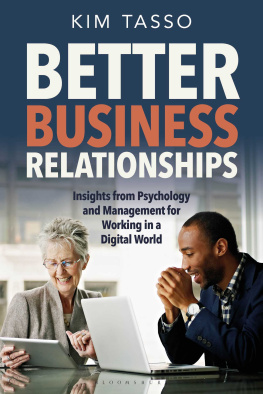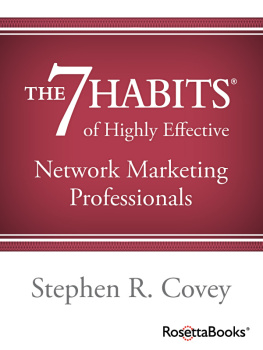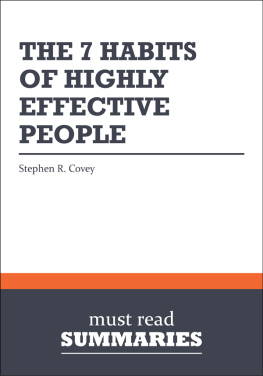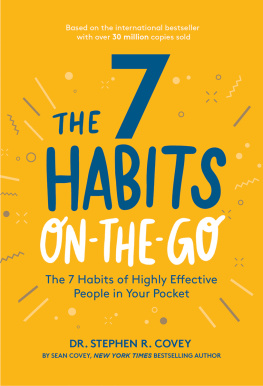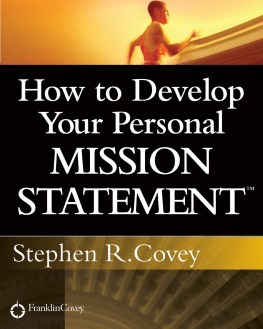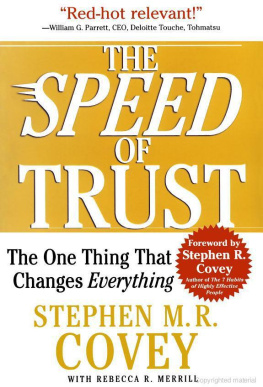Stephen R. Covey - How to Succeed with People
Here you can read online Stephen R. Covey - How to Succeed with People full text of the book (entire story) in english for free. Download pdf and epub, get meaning, cover and reviews about this ebook. year: 1993, publisher: Deseret Book Company, genre: Home and family. Description of the work, (preface) as well as reviews are available. Best literature library LitArk.com created for fans of good reading and offers a wide selection of genres:
Romance novel
Science fiction
Adventure
Detective
Science
History
Home and family
Prose
Art
Politics
Computer
Non-fiction
Religion
Business
Children
Humor
Choose a favorite category and find really read worthwhile books. Enjoy immersion in the world of imagination, feel the emotions of the characters or learn something new for yourself, make an fascinating discovery.
- Book:How to Succeed with People
- Author:
- Publisher:Deseret Book Company
- Genre:
- Year:1993
- Rating:5 / 5
- Favourites:Add to favourites
- Your mark:
- 100
- 1
- 2
- 3
- 4
- 5
How to Succeed with People: summary, description and annotation
We offer to read an annotation, description, summary or preface (depends on what the author of the book "How to Succeed with People" wrote himself). If you haven't found the necessary information about the book — write in the comments, we will try to find it.
A collection of short, persuasive essays on how to develop happy and meaningful relationships, this book offers specific and practical strategies for improving your interactions with others. The author shows how to prepare yourself personally by developing strength, patience, self-understanding, and spirituality. He also shares advice on how to build harmony, discipline, and communication in your home.
How to Succeed with People — read online for free the complete book (whole text) full work
Below is the text of the book, divided by pages. System saving the place of the last page read, allows you to conveniently read the book "How to Succeed with People" online for free, without having to search again every time where you left off. Put a bookmark, and you can go to the page where you finished reading at any time.
Font size:
Interval:
Bookmark:


1971 Deseret Book CompanyAll rights reserved. No part of this book may be reproduced in any form or by any means without permission in writing from the publisher, Deseret Book Company, P.O. Box 30178, Salt Lake City, Utah 84130. This work is not an official publication of The Church of Jesus Christ of Latter-day Saints. The views expressed herein are the responsibility of the author and do not necessarily represent the position of the Church or of Deseret Book Company.Deseret Book is a registered trademark of Deseret Book Company.
I
Self
Take Time to Sharpen the Saw
If you were guaranteed that by using one hour a day in a particular way you would both enjoy and be more productive in the other twenty-three hours, would you do it? "Of course I would," you say.
But would you? You should, because it's literally true and can be proven by any individual willing to give it a fair trial.
The purpose and content of this one hour is to sharpen our three instrumentsour body, our mind, and our spirit. It takes time and effort to sharpen them, but this time is negligible compared to the time (and nerves) saved.
Sometimes when we are terribly busy and under a lot of pressure, with many commitments and involvements, we become neglectful of the only instruments or tools we have to do our work. We think we haven't time to consider them. In a sense we are literally saying, "I am too busy sawing to take time to sharpen the saw."
I suggest three activities for this hour: one physical, one mental, one spiritual.
First, physical exercise.
I won't take time to repeat all the obvious benefits of physical exercise but will only underscore the well-attested fact that a program of regular exercise increases one's efficiency in every facet of life, including the depth and restfulness of sleep. And the time taken can be minimal; just a few minutes of calisthenics and running in place in one's room or jogging around the yard or block is often sufficient. Exercising doesn't take time. It saves time. Still, few consistently do it.
Second, planning.
Many of us feel that no matter how hard we apply ourselves or how we reorganize our time, we still have the feeling of being behind, of being pushed and pressured, of having more things to do than we can satisfactorily handle.
Sometimes the answer is found in working longer and harder, but often the real key is in working smarter.
To work smarter requires planning. Planning is creative thinking. It involves analyzing the needs of situations, setting goals or objectives, and determining a course of action in achieving them.
Such hard mental work takes a little time, but without it we become bogged down in detail and trivia, pushed here and there, responding only to the immediate pressures, to the demands and wants of others, to symptoms rather than to the causes of problems and the real needs of situations. Goethe put it this way: "Things which matter most must never be at the mercy of things which matter least." Careful planning helps us maintain a sense of perspective, of purpose, and of ordered priorities.
The more rushed we are, the more time we better spend planning our time and actions. Otherwise we become like the frantic driver who is too much in a hurry to go two miles out of his way to take the freeway and who then proceeds to burn himself up, rushing, then cussing every red light and every slowpoke on the old highway.
Third, meditation, scripture study, and prayer.
Interwoven with planning is the effort to provide nourishment for the spirit, which we are all in constant need of as much as we need food for the body.
Prayerfully studying God's word in the scriptures and listening, through quiet meditation, to the still small voice within will result in a sense of eternal perspective, of divine need and purpose. It will also chasten, enlighten, and motivate, and is excellent preparation for secret prayer. Such prayer, offered from a sincere heart, is a perfect time for recommitment, for promising to obey the laws upon which the blessings requested are predicated. "... thy vows shall be offered up in righteousness on all days and at all times...." (D&C 59:11.)
The great reformer Martin Luther understood this principle: "I've got so much to do today I'll need to spend another hour on my knees." To him prayer was not a mechanical duty but rather a source of power in releasing and multiplying his energies, by renewing an alliance with One who alone could make him equal to the day's tasks.
To use a physical analogy, such an alliance that is continually renewed in prayer is comparable to a farmer's using a powerful harvesting machine as contrasted to his neighbor's doing it all by hand because he couldn't "afford the time or money or bother" to rent one.
These three activities need not take more than one hour a day, but they will immeasurably influence the quality of the other twenty-three, for we are working upon the roots of both our problems and our successes. A sharp saw always cuts faster and better, and we must never be too busy to sharpen ours.
Be Strong in Hard Moments
There are certain moments in every person's day that, if excellently used, will determine the direction and quality of all the other moments. These certain moments are few in numbersometimes very few. They are necessarily hard moments, testing moments.
Missionary work illustrates this well. There are generally three crucial moments in a missionary's day, and if he can be strong or true in these three hard moments, everything else tends to fall into place successfully.
These three moments are (1) getting up at 6:00 A.M.; (2) the initial moment of contacting; and (3) the moment when he gets an investigator to make a commitment.
1. The time of 6:00 A.M. in the schedule of missionary life symbolizes mastery over the flesh. Mind over mattress. If a missionary can overcome the pull of the flesh in the beginning moment of his dayoften his hardest momenthe can overcome the lesser moments.
2. Initial contacting of new people takes initiative and courage. If the missionary will plunge into it at the appointed hour, refusing to shrink from it by doing easier things, he will develop power reserves to do many other hard things well.
3. Being strong, with love, in committing investigators to obey gospel laws, tests and nurtures both the emotional and the spiritual roots of the missionary. Conducting safe but powerless philosophical gospel discussions takes little strength or courage.
Isn't it also true that if we, as parents or students, are courageous in just a few hard things each day, all else will fall into place? Sounds simple, I know, but I believe the answer is yes. The proof is in the doing, and this is not simple.
Certainly these things vary with each individual. Each must examine himself to find the few crucial daily moments that determine so much else.
Consider three things, three hard moments that are so basic and so determining for so many.
First, getting up in the morning when we know we should.
Always being a few minutes behind in our work is a kind of emotional mortgage on the day. Tyrannized by the clock, we interpret almost every event selfishly. We fret and worry. We become overly impatient with weakness and mistakes, our own as well as those of others. Interruptions and inconveniences are resented. No time for kindness, for listening, for extra service. The spirit of rushing and hurrying destroys a good family spirit.
Font size:
Interval:
Bookmark:
Similar books «How to Succeed with People»
Look at similar books to How to Succeed with People. We have selected literature similar in name and meaning in the hope of providing readers with more options to find new, interesting, not yet read works.
Discussion, reviews of the book How to Succeed with People and just readers' own opinions. Leave your comments, write what you think about the work, its meaning or the main characters. Specify what exactly you liked and what you didn't like, and why you think so.

